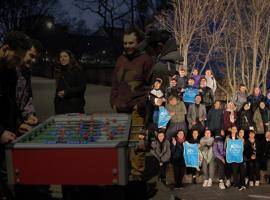The most interesting aspect of the work during the pandemic was the re-design of the activity aimed at listening to people living and working in the territorial areas of the project. The Covid-19 lockdown entailed the risk of losing contact with people engaged in the launch event or met during the research activities or somehow informed of the ToNite project.
Let’s talk online
What could be done to remedy this? As we had all switched over to smart working, the project attempted to organise online meetings.
This answer may seem obvious but, in fact, most of the people and organisations the partnership met were not used to carrying out meetings online and it could not, therefore, be taken for granted that this would be a success.
The project manager told me in an interview that “somehow we discovered that we had more time, and we spent this time listening”. This is not a celebration of distance calls. Face-to-face interaction is much more effective in grasping the nuances in how the speakers express themselves in their speech and body language. Online platforms have well-known limits, but some positive aspects did emerge from the project:
1. Punctuality;
2. Straight to the point, no wordy introduction;
3. Call etiquette. Participants did not interrupt each other. A high level of respect was shown.
Frequently, during personal gatherings, people talk over one another; it is difficult to make yourself heard and, to be quite frank, it can be exhausting. Often, after a personal public gathering, you go home with the feeling that you have no more information than you had before and that the people you met feel depressed as they could not express themselves as and when they wanted. It can be tiring and sometimes disappointing.
It is not known why the meetings went well. It may be the case that nobody felt competitive with each other so every meeting was fruitful and resulted in suggestions to be discussed with other people. Nobody felt that they needed to legitimise themselves. They were already legitimised as they were there, connected.
The attitude of the municipality was also different. The municipality invested time in order to speak one by one, with more openness to listening and to dialogue. There was undoubtedly a greater investment of time but the time spent was also more efficient and effective. There was no feeling that it was too time-consuming. In fact, in terms of hours, the time spent was certainly longer than the time required for two or three in-person meetings. Ultimately, from 13 March to 19 May 2020, the municipality, with the valuable support of the partner Espereal, held twelve online meetings with the local communities and the organisations working in the area.
As stated by the project assistant: “We would not have obtained these results in face-to-face meetings and we would not have had the time to meet all these people”. But they found the time; it was just a different time.



 Urban security
Urban security















